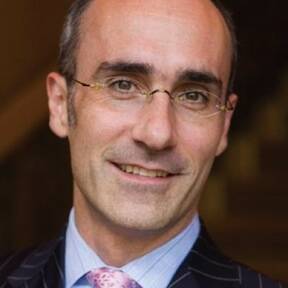If you enjoy, as I do, a weekly excavation of the Sunday New York Times, you no doubt have come upon the commentary of Arthur C. Brooks, recently named a Times op-ed contributor.
Brooks is the President of the American Enterprise Institute (AEI), a conservative think tank in Washington, D.C., and before that held the position of professor of economics and social entrepreneurship at Syracuse University. At the Times, he has written on a number of topics that intrigue and unsettle today’s professional class, including the nature of happiness, the meaning of work, the price of higher education, and the funding of non-profit institutions.
Brooks writes with the same measured tone of the other Brooks -- David Brooks. Like D. Brooks, Arthur Brooks's writings exude a contemplative, gentle breeze of conservatism. And like D. Brooks, Arthur Brooks frequently seasons his convictions with studies and statistics, re-articulating timeless precepts in the lingua franca of a quantifying, calculating age.
For example, in a recent column on why "work is the epicenter of the good life" ("The Father's Example") Brooks told an anecdote about his son, recalled the words of Buddha, and then turned to numbers: “The data confirm that hard work is correlated with well-being. The University of Michigan’s Panel Study of Income Dynamics polls thousands of American families, and its 2009 results show that people who feel good about themselves work more than those who don’t.”
In another essay that typifies his style (“Beware the City Dolls,”), Brooks told college graduates to “[e]arn everything,” adding, "The best research shows that unearned resources can be toxic for well-being. One well known study from Northwestern University tracked lottery winners. They found that while winners described hitting the jackpot as a positive event, they were not actually any happier than a control group of non-winners.”
Sometimes his essays integrate multiple disciplines and authors, as if he's not so much giving his opinion but drawing out an implicit consensus. In his most recent piece, an approximately 2,000-word analysis of what makes people happy ("Love People, Not Pleasure"), Brooks conscripted the following in service of his thesis: (1) the research of Princeton psychologist Daniel Kahneman; (2) a 2009 study out of the University of Rochester; (3) the 2004 data of two economists who studied the correlation between sexual activity and greater well-being; (4) the writings and example of Abd Al-Rahman III, emir and caliph of 10th-century Córdoba; (5) a "probably apocryphal" story concerning Calvin Coolidge; (6) St. Paul's letter to Timothy; (7) the Dhammapada, a collection of Buddha's sayings; and (8) and Brooks's own encounters in Washington with high-profile pundits and media personalities.
That track having been laid, where was he heading? In Brooks's words, the formula for happiness can be stated thus: "Love people, use things."
Although I cannot draw too many conclusions about Brooks's oeuvre (I haven't read any of his ten books), from what I have read I admire his effort at synthesis, his desire to thread together disparate strands of information. Perhaps this comes from his own background: Brooks dropped out of college at 19 and spent his twenties as a musician, even playing French Horn in the Barcelona Municipal Orchestra. Having experienced lots of life before returning to academia, Brooks probably gained an appreciation for the multidimensionality of the human person not obtainable in a more linear path from undergraduate studies to a Ph.D. He seems to have absorbed what all genuine religious experience teaches: There is a meaning beyond measurement.
It also seems, from what I’ve read, that Brooks is trying to distill a meta-narrative of the kind I wondered about recently in relation to TED Talks. In his op-ed pieces and in his leadership at AEI, I sense an interest (even if unintentional) in responding to the inquiries that philosopher Alasdair MacIntrye once faulted modern universities for failing to address: "In what does the unity of a human being consist? And how should the findings of each of [the academic] disciplines contribute to our understanding of ourselves and of our place in nature?"
A clue to Brooks's views might be found in his religious faith. He is a Catholic, which makes me wonder whether, and how, the "both/and" principle of the Catholic intellectual tradition, as well as the deposit of Catholic social thought, influence his thinking. One recent event might be revealing: Earlier this year, an AEI panel composed of various experts -- including the Dalai Llama -- took up the question of happiness and human flourishing. While some interpreted this event as no more than a Brooks-driven belief in benign humanism, there is potentially a much richer motivation: The topics of happiness and human flourishing, as many readers know, are central concerns for Catholic ethics and theology. Was the spirit of Aquinas lurking in the background?
Of course, I'm not certain, and my conclusions remain tentative until I have a chance to read a few of Brooks's books or, perhaps, interview him for a future post. In the meantime, his is an intriguing project to follow. (For those interested, you can find his New York Times archive here.)








